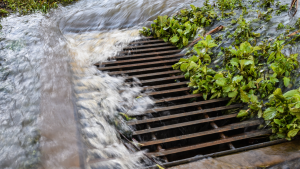
By Shannon Kennedy, ANR Educator, UGA Extension Forsyth County
So far this year, we have seen 14 notable storms come out of the Atlantic, and most areas of Forsyth County have received more than 50 inches of rain. As we see more storms, there is an increase in water runoff from our roads, lawns, and driveways. This results in the movement of fertilizers, pesticides, oil, gas, and other chemicals from private and public property into adjacent streams. As that water moves downstream it eventually joins a reservoir where it will be used for drinking water. This forces us to confront a sometimes hidden truth: People downstream are at the mercy of how we protect our water quality, just as we are at the mercy of the people upstream.
So how do we start taking care of our water? Recently approved county ordinance amendments encourage incorporating low-impact stormwater features into open space designs. The daily practices of county residents, however, have a far greater influence on protecting water quality.
The first step in reducing pollution in stormwater is thoughtfully managing landscape care chemicals. Excess fertilizer washes out of the soil and into streams. Reducing fertilizer applications to maintenance levels allows plants to take up the fertilizer without waste. A UGA soil test provides fertilizer recommendations specific to the plant and the actual condition of your soil. The soil test also measures your soil pH and makes recommendations for amendments to achieve the optimum pH for nutrient uptake of the particular plant you’re growing. If the pH is wrong, the nutrients in the soil do not get used and it leaches out of the soil into groundwater from which it eventually enters streams or lakes. You also want to be aware of when you are fertilizing: there is no point fertilizing if plants are dormant and fertilizing during drought can cause damage to plant roots. By avoiding these situations, you can save fertilizer for later when it will benefit your landscape.
Another way you can protect water quality is by being strategic about the way you apply pesticides. Use the least impactful way of controlling weeds, disease, and insects first, then work your way up to stronger chemicals. This strategy is often referred to as “Integrated Pest Management”. IPM serves to protect people and the environment as much as possible while keeping pest damage at an acceptable level. Avoid applying chemicals while it is windy, or if there is a storm in the forecast. Other instructions for how to use the chemical safely will be listed on the product label and remember that following the label’s directions is prescribed by law.
When you are preparing pesticides for use, or when you are filling equipment with gas, make sure to do so on a paved surface. This will make clean-up much simpler in the event of a spill, and it protects your lawn from harmful chemicals. Collect any spilled granules instead of sweeping them into the lawn and use kitty litter or absorption pads to clean up spilled liquids. Dispose of empty containers as the label requires; not all containers can be safely discarded alongside household waste.
While chemical management is incredibly important for water quality, there are also a few practical things you can do to help reduce the amount of stormwater runoff. One of the best strategies is to minimize the number of paved surfaces on your property. Gravel, pebbles, and mulch can serve as a pathway or parking area, and the materials allow water to soak into the ground. Another idea is to divert the water from your downspouts into flowerbeds instead of onto pavement where it will wash chemicals into a storm drain. If you frequently have water washing over your lawn during storm events, you may want to consider installing a rain garden. Rain gardens serve to intercept and collect water so it can sink into the ground over time. In your gardens, make sure you are mulching to hold soil down and add organic matter to the soil to improve your soil’s water retention.
There are many ways that you can protect water quality in your landscape. If you have any questions about these methods, or if you are interested in testing your irrigation water quality, call or email Forsyth County Extension. We would love to help.